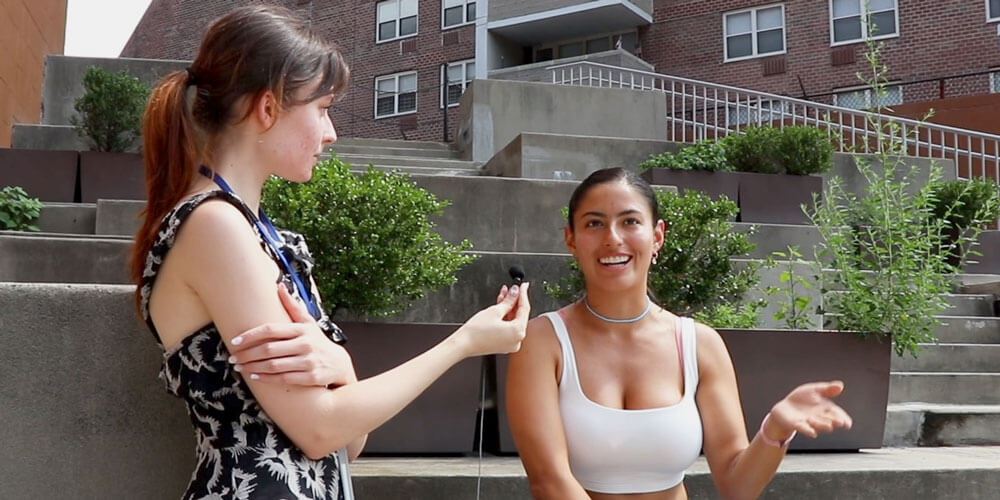Thousands of CUNY students are experiencing a new kind of developmental support after CUNY completed a major reform to its developmental program in fall 2022. New York City’s public colleges discontinued prerequisite developmental math and English and mandated that students be allowed to enroll in college-level math and English, with support for the students who need it.
Before corequisites were introduced, associate degree-seeking students at many CUNY colleges whose placement exams or proficiency index scores were below passing were placed in non-credit-bearing remedial English or math courses, which they had to complete before taking college-level courses. These students were delayed in completing their degree requirements and were less likely to graduate.
Under the corequisite approach, students whose scores put them in a remedial English or math course are now placed in a credit-bearing course, which gets them off to a faster start while they also get support—most often through a paired noncredit course—to address any gaps in their preparation.
Rhoda Wilson, a rising sophomore majoring in communications at the College of Staten Island (CSI), took remedial math in the summer of 2022 through a pre-college workshop. Not long after, she became a math tutor at the college for students in noncredit pre-college remedial programs. This fall she will be a tutor in corequisite courses.
Wilson said the new system is a good thing because it is more motivating for students. In standalone remedial courses or pre-college workshops, “students are generally bummed out about having to take a noncredit class,” she said.
“As a tutor, I tend to see a lot of students not giving it their all because all they have to do is pass a class that really has no value because it is a no-credit,” she said.
The corequisite approach is geared toward providing students with academic support and increasing their confidence and motivation by keeping them on track to their degree.
Recent research suggests that corequisite courses can lead to a higher rate of English and math course completion and can help with the transition to college. In a new study, CAPR, a developmental education research center led by CCRC and MDRC, is investigating CUNY’s implementation of corequisites and the different models the colleges are implementing. The study is also looking at student and staff experiences and the various factors facilitating successful implementation of the courses.
In the fall of 2022, I was one of the students assigned a corequisite English course at CSI, where I am studying psychology and English. The corequisite English course allowed me to attain college credits as I fulfilled my remedial requirement, making it a beneficial step up. I had already completed a noncredit summer math program, and the lack of credit discouraged me.
I was not alone in feeling discouraged.
Sophia Loza is a sophomore majoring in business at Borough of Manhattan Community College (BMCC). When she enrolled in BMCC in 2018, she was notified by the college that she would have to take a remedial math course during the summer semester before the academic year.
“The fact that I didn’t receive any credit from it was a bit annoying,” said Loza.
Loza also felt that she did not particularly need the course. Still, she said it helped her progress toward her degree by preparing her for what was to come in the fall semester.
Loza hasn’t taken a corequisite course but thinks it would be a better way for students to make progress while also getting the extra help that they need.
“I think that kind of change is more positive; students receiving credit for taking these classes should be a requirement and is the bare minimum,” said Loza. “If we are in school, taking these courses—even if it’s remedial math—it still counts. Had I gotten a college credit when I first joined, I would have really appreciated it.”
Koral Caruso, an adjunct lecturer at the College of Staten Island, started teaching English corequisite courses at CSI in the fall of 2022. Having been placed in a remedial English course in college herself, she considers her personal experience with remedial education an influence on her teaching. She is motivated to provide a comfortable environment for her students, give them personal attention, and increase their confidence.
“It’s been good to spend more time with students one-on-one in the classroom,” said Caruso. “I was able to do that more in the corequisite class, which is what it was designed for.”
The language change in the switch from traditional remedial courses to corequisites has played a role in helping to boost confidence in students, Caruso said.
“The word ‘remedial’ is still being used,” she said. “It’s a really negative word, and it has a lot of negative connotations. It affects students’ self-esteem, so to move away from the course and the word I think is great.”
Despite the research, not everyone agrees that corequisite courses are the best solution for all students.
Barbara A. Lawrence, deputy chairperson in the Department of Mathematics at BMCC, is teaching a STEM math corequisite course. Because the course is designed for students whose scores indicate they are proficient in math, it focuses on higher level math than the typical CUNY corequisite course. But Lawrence is skeptical that the structure of the course gives her students what they need.
“Personally, I really don’t think that course works, and I have tried different models having taught it,” Lawrence said.
She is concerned about STEM students having to take more hours of demanding math. Students in the corequisite course take two to four hours more math than students in a regular college-level math course. The material is just as complex, she said, and when combined with longer hours can frustrate students.
“You really have to be patient, particularly when you’re teaching these corequisite courses, because the students do have bad gaps,” said Lawrence. “Sometimes the instructors will just think about the credited part of the course and forget that those are not those students and you have to start where those students are.”
Lawrence is also the coordinator of BMCC’s Immersion Program, which allows students to satisfy remedial requirements with free summer- or winter-session workshops, one of many non-course remedial options at CUNY. Some professors are concerned that because the workshops are optional, students are less likely to attend, raising the question of whether workshops like these should be mandatory for students needing more help.
But the students I talked to preferred the idea of corequisites.
“As someone who attends a CUNY, I think the policy is great. I think it could benefit students immensely,” said Tathyana Ferrer, a rising sophomore and fine arts major at Kingsborough Community College. “Due to the classes not giving students any credits before, I definitely could see how it previously was unmotivating and made students feel like it’s a waste of time.”





